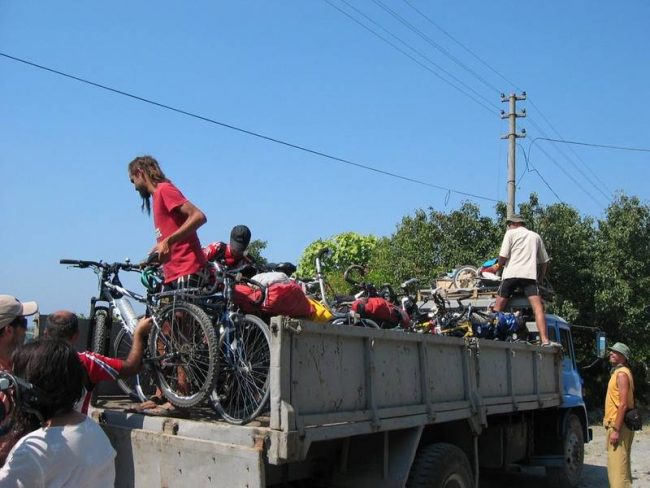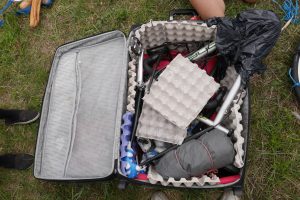Overview
There are different ways to get around Europe taking your bike with you.
- Cycle!
- Hitchbike (take your bike with you while hitchhiking). It usually takes much longer, but is generally possible. People have also hitchbiked on boats.
- Take a bus. Some buses officially take bikes. Usually you have to take the luggage off, sometimes you have to take off the wheels and pedals and wrap the bike in a plastic bag. Sometimes, the bike is stored in the luggage compartment of the bus, sometimes there is a special bike rack in the end. If a bus company officially takes bikes, it is usually written in the section about luggage on their website. Usually it costs around 10 € per bike. One website where you can search for buses across Europe is Busradar, although it doesn’t know about all the lines. Rome2Rio can also be good to get an overview over the available connections.
In the past, a lot of participants were travelling with their bike across europe. We had different expieriences, it is often somehow possible to take the bike, even if they say beforehand that its not. As long as the bus is not completely filled up. Although, this might include some stressful discussions with busdrivers… But it also happens that people get rejected. If you search for the bus company and ‘taking bikes’, there are always many stories from people about how to do it. We made a table with bus-companys and how they are with bikes: https://calc.rankenste.in/jzc11eny1a (might be a bit outdated). - Extra Tipp for Flixbus: As mentioned before you can take a bike on some Flixbuses. But actually it’s the fewest of the connections where you can actually take a bike with you on a special rack. More often it’s possible to take a bike with you as an oversize luggage which costs you 9€. In this case you have to disassemble the frontwheel and handlebar and wrap the bike in some sort of sack. But it’s a bit more tricky than that. With flixbus, you have to book a ride, and you are only able to call Flixbus EARLIEST 48h before the bus goes to reservate your oversize luggage. The problem is, sometimes they don’t allow oversize luggage, and now you stand there, and have to cancel your ride, book another one and hope to get your bike on that one. But there is a way to increase chance. The thing is, that they never allow oversize luggage on doubledecker busses. During booking your ride, you can check that through clicking on seat reservation, and there you go. Here you can see whether it’s going to be a doubledecker bus or not! If it’s doubledecker, don’t book it and look for a different connection. If it’s not, go for it! A Flixbus employee once told me this trick. I’m not sure why they are only able to tell you 48h earliest before, but maybe the bus size might change. So be carefull, and don’t trust this method 100% :)
 Take a train. The regulations are different in every country. On the website of Deutsche Bahn, you can search for connections that take bikes across Europe. For international journeys, you need an international bike ticket, which costs 10 €. Usually, if you take your bike apart and wrap it up, it counts as regular luggage and you can take it on any train without paying for it. For train journeys that cross country borders, it always makes sense to check the railway companies of all countries, as prices might differ greatly. Sometimes, it is even cheaper to book a ticket from a country where you don’t even want to go (a ticket from Berlin to Cologne might cost 89 € with German railways, but a ticket from Prague to Cologne via Berlin might cost only 45 € with Czech Railways, and you can still use it to travel from Berlin to Cologne). Bikes in train in Spanish territory and Bikes in train in Portugal
Take a train. The regulations are different in every country. On the website of Deutsche Bahn, you can search for connections that take bikes across Europe. For international journeys, you need an international bike ticket, which costs 10 €. Usually, if you take your bike apart and wrap it up, it counts as regular luggage and you can take it on any train without paying for it. For train journeys that cross country borders, it always makes sense to check the railway companies of all countries, as prices might differ greatly. Sometimes, it is even cheaper to book a ticket from a country where you don’t even want to go (a ticket from Berlin to Cologne might cost 89 € with German railways, but a ticket from Prague to Cologne via Berlin might cost only 45 € with Czech Railways, and you can still use it to travel from Berlin to Cologne). Bikes in train in Spanish territory and Bikes in train in Portugal- Find a rideshare. The most known website is BlaBlaCar, although it is commercial and evil. Some German alternatives (that also have international journeys) are BesserMitfahren and Fahrgemeinschaft. Most rides cannot take a bike, but some go with a van and have space. French alternative: LaRoueVerte
- Take a ferry.
Travel groups
Some months before the start of the Biketour, we will put online a registration form where you can sign up to join. That will put you on a participants mailing list where you can contact other people who are also planning to join the tour, for example to organise travel groups.
Country-specific travel advice
Useful links:
- FacilMap with public transportation layer
- Busradar (bus connections across Europe)
- Deutsche Bahn (quite good at finding international train connections, does not work so well on the Iberian peninsula)
By bus
In Spain the main company offering long-distance routes is Alsa. Their prices are generally better than using trains. You can take your bike for a fee of «€5 on short trips or €10 on longer journeys». You can read the conditions for transporting a bike here.
Flixbus also has a direct line from Paris to Porto (stopping in Bordeaux, Bayonne, San Sebastian, Bilbao, Santander, Santiago, Vigo and Pontevedra). You can’t buy a bike ticket for this line but you might be able to take it as an extra luggage. You must call the company 48 hours before a ride to reserve a space for it and then check with the driver if they let you take it. Check their policy here.
Also keep in mind that if you are using InterFlix codes to get to Spain or Portugal from Paris, you won’t be able to use those codes to go back by the same line.
By train
Connections can be found on Renfe. There are different types of trains (info on Renfe, in a blog):
- Long-distance trains (LD, AVE, Avant, Alaris, Altaria, Alvia, Arco, Euromed, Talgo, Star, Trenhotel): Bikes have to be folded or packed (pedals removed, handlebar turned)
- Regional (medium-distance) trains (MD, Intercity, Regional Express, Regional Cadence, Regional Delta, Regional Lynx, TRD, TRD, R-598, Series 499, Series 599, Celta): Bikes can be taken if there is space, can be reserved, 3 € if more than 100 km.
- Local trains (Cercanía): Bikes can be taken for free.
Unfortunately, there seems to be no way to search for connections using only regional trains. This map of medium-distance trains might be useful. Here you can find the map split up into region but bigger (overview of the regions). Find out where you will have to change and then find the individual trains using Renfe. Usually medium-distance trains have a fixed price and tickets can be bought on the train (not sure if always).
It seems like Intercity trains go further distances, accept bikes, have flexible prices but are not on the map.
Bus
There are 3 main bus-companies in France, according to this page about taking bikes on busses:
- Flixbus/Megabus: You can officially take bikes on some lines, for example Strasbourg–Paris. You always pack your bike and book a big piece of luggage for 9€
- isilines/Eurolines: On the compare page it says, when they asked the company, the answer was they would take a bike when it can be taken apart and not more than 5. On their own website they say they don’t take bikes…
- Ouibus/Starshipper: Would have to be packed in a box where length+height+width<200cm. Which is normally too small for a bicycle.
Train
- The high-speed trains (TGV) are fast but expensive, although booking early might provide some cheaper options. There are very limited spaces for bikes which have to be reserved and are often already booked out many months in advance. Sometimes it’s worth to check train companies of neighbouring countries (such as German Railways) if they have a cheap offer that is crossing the border (you can also board the train later, for example buy a ticket from Freiburg to Paris but only get on the train in Strasbourg if it stops there).
- The regional trains (TER) take bikes for free and have space for them. Prices are fixed. The train lines themselves are not going very far and are not coordinated with each other, and it can take up to 3 days with 10 changes to cross the whole country, for a total price of at least 150 €. The French train company does not offer an option to find connecting trains, so you have to look up the connection first on Deutsche Bahn and then look up the price for each individual train on OUI.sncf. As the ticket prices are fixed, better buy them at each station in case you miss a connection.
There is this page for cheap second-hand train-tickets: http://www.trocdestrains.com/
Most busses from Flixbus take bikes for 9€ extra.
Almost all regional trains take bikes. Only some of the higher-speed trains take bikes (IC/EC/ICE). On bahn.de, there is a checkbox to search for connections that officially accept bikes all across Europe. For regional trains, you have to buy a Fahrradtageskarte Nahverkehr (5.50 €) for your bicycle (on some connections, you can take a bike for free, but the regulations are complicated and in German). For higher-speed trains, the bicycle ticket costs 9 € and has to be reserved in advance. Because the train companies still live in the past, when you want to take a bike across a national border, you suddenly have to pay 10 €. Tickets can be bought online, and every German train station has a ticket machine where you can buy them.
For the passenger ticket, there is the possibility to buy a day ticket for all regional trains across Germany for 44 € for the first person and 8 € for each of up to 4 additional people (Quer-durchs-Land-Ticket, on Saturday and Sunday Schönes-Wochenende-Ticket for 40+4×4 €). This makes it particularly cheap to travel in groups, for example for 5 people the price is 15.20 € per person (11.20 € on Sat/Sun) for all across Germany. Individual regions have a separate regional ticket, for example Baden-Württemberg for 23+4×5 €. Everything plus the ticket for the bike(s).
Flixtrain has some cheap high-speed train lines in Germany that accept bikes for 9 € and also animals and cost much less than Deutsche Bahn trains.
If you have any hints or tips you would like to share with us like special offers, good train routes, or which bus companies are bike friendly, you can leave us a comment below or write us an email at 2022 at ecotopiabiketour dot net!






